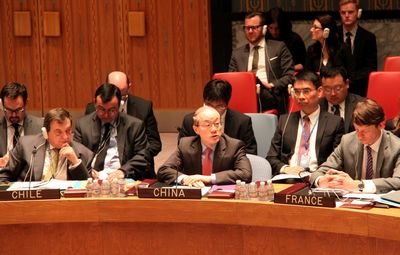| Statement by Ambassador Liu Jieyi at the Security Council Open Debate on Security Sector Reform |
| 2014-04-28 23:15 |
|
(PHOTO: XINHUA NEWS AGENCY NIU XIAOLEI)
Mr. President, The maintenance of international peace and security is one of the purposes of the United Nations as laid down in its Charter. As such, it is a cornerstone of the work of the Organization. The establishment of stable, sustainable and secure environments is a basic premise and foundation for achieving general security, promoting economic and social development and advancing progress in various areas in post-conflict countries. United Nations assistance to the SSR efforts of countries emerging from conflict and restoring an effective and professionalized security sector is not only critically important to those countries, it can also help the Organization and the Security Council to better carry out their sacred duties, as enshrined in the United Nations Charter. Through its peacekeeping and peacebuilding activities in recent years in places such as the In the meantime, as the situation has evolved, the United Nations has encountered various new problems and challenges that arise in offering assistance with SSR. I would like to make the following four points on how to better support SSR efforts for countries emerging from conflict. First, the United Nations must respect the wishes and ownership of the countries concerned. The maintenance of national security comes under the rubric of national sovereignty. When offering support for SSR efforts in countries emerging from conflict, the United Nations and the international community should always respect the principle of national ownership, and, on the basis of full respect for the wishes of the countries concerned, provide constructive capacity-building training and advisory assistance. There are no universally applicable best practices for SSR; there can only be the formula that best fits the specific situation of an individual country. In offering assistance, therefore, the international community should take into full consideration the specific requirements and situation of each country concerned. Secondly, the United Nations should strengthen its overall planning in assisting the SSR process in countries emerging from conflict. There can be no doubt about the importance of SSR, but it is not a panacea, and it cannot turn a country's security situation around alone. The United Nations should help the countries concerned to incorporate SSR into their integrated development strategy, so that it can be promoted in a comprehensive and complementary fashion along the with political process, national reconciliation, the promotion of the rule of law, the elimination of poverty and the pursuit of economic development. Only in this way can the United Nations help countries attain lasting peace and sustainable development. Thirdly, the United Nations should leverage its advantages by coordinating the efforts of all parties concerned. There is a multitude of actors and stakeholders in the SSR process at the moment. On the one hand, the United Nations should be a coordinator among the countries concerned and the potential assistance providers. On the other hand, the United Nations should encourage Member States to be actively engaged in the discussions on SSR through such platforms as the Peacebuilding Commission, the Special Committee on Peacekeeping Operations and the Group of Friends of Security Sector Reform. In the meantime, the role of such mechanisms as the inter-agency Security Sector Reform Task Force should be brought into full play, and coordination and division of labour among various departments of the Secretariat should also be strengthened so as to foster synergy. Fourthly, the United Nations should give priority attention to its coordination and cooperation efforts with regional and subregional organizations. Over the years, regional and subregional organizations - and the African Union in particular - have conducted a tremendous amount of work in assisting countries emerging from conflict. They possess a unique appreciation of the situation and a wealth of experience. The United Nations should strengthen its cooperation with regional and subregional organizations in SSR through workshops, training courses and personal exchange. The United Nations should also build upon its successes and beneficial practices and increase its support for and further motivate those organizations to participate in the relevant work. Thank you, Mr. President. |
| |||||||||||||
| |||||||||||||
